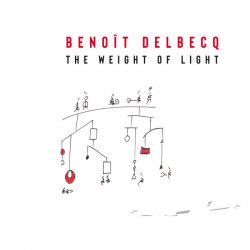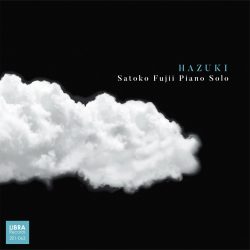Jazz Album Reviews: Benoît Delbecq and Satoko Fujii — Resilience Made Beautiful
By Steve Feeney
A couple of adventurous pianists decided, as their latest solo releases confirm, to use forced isolation as a spur to inspiration.
Benoît Delbecq – The Weight of Light (Pyroclastic Records)
Satoko Fujii, Piano Solo – Hazuki (Libra Records)

During this ever-so-long-lasting pandemic, many us have been tempted to pull the blankets over our heads and wait it out. But a couple of adventurous pianists decided, as their latest solo releases confirm, to use forced isolation as a spur to inspiration — they sat down at their instruments (and occasionally crawl inside) to craft nuanced, exploratory inner musical journeys. Now they are sharing the recorded results.
Benoît Delbecq’s The Weight of Light is the perfect record to accompany a winding drive on a rainy day. Its inventive assemblage of drips, drops, plinks, and plops precipitate the kind of reflective moods associated with a darkened and saturated world.
According to the Paris-based pianist, he is attempting to come up with musical structures that reflect the variety of angles created by light and shadow. Does he succeed? Who knows? But the approach generates deeply fascinating music — if you are willing (and have the patience) to let it gently wash over your ears.
Delbecq invites listeners in via a prepared piano (the key to the intimacy of his vision) on an album that he recorded (and produced) in March, 2020. Surface turmoil is kept to a minimum, the better to follow the delicate movement of his ideas.
Percussive minimalism and Gamelan music both come to mind as influences. The pianist undertakes a number of original pieces, such as “The Loop of Chicago” and “Pair et Impair” — at eight-minutes-plus they are the longest of the disc’s compositions. All of them focus on tonal variations and temporal subtleties — this is music crafted to draw you into a contemplative place.
Fans of resonant chamber jazz will find considerable solace in the self-consciously reflective “Broken World.” Delbecq’s music throughout most of the album is more analytical than it is romantic. Still, the emotive quality of this last cut suggests that there may be more passion roiling under the surface than the listener might suspect.

Satoko Fujii has been a whirlwind of recording and touring for decades. The pandemic curtailed her touring. But Fujii’s recording output has continued, though it is far from the tidal wave inspired by her 60th birthday in 2018, when she released a new disc every month.
Hunkered down in her native Japan for the last year, the pianist/composer decided to record a solo disc on an instrument she usually reserves for practice only. The result is Hazuki (translation: August), named after the month it was made.
Fujii only briefly delves into the innards of the piano. The eight original pieces here generally come off as late-modernist piano works, spiced up with touches of avant-garde jazz and folkish motifs. Most of the compositions reflect a serious-to-somber mood, apropos of COVID times.
In the liner notes, Fujii offers clues to what she’s up to (in English and Japanese). For some pieces, she provides technical insights as well as underlining the emotional motivations that inspired the works.
“Beginning” and “Expanding” offer a rhythmic route into her zig-zaggy world, the latter piece supplying intense ruminations in the spirit of Cecil Taylor.
The more touching pieces on August offer unusually rich melodic material along with the Boston-schooled musician’s usual abstract dazzle at the keyboard.
“Ernesto” is dedicated to (the good side of) Ernesto Che Guevara, the Cuban revolutionary who was also a physician. Fujii had recently read a biography of Guevera and, after hearing of Cuba’s aid to Italy during the pandemic, she was moved to express her feelings of warmth and respect.
“Hoffen” (hope in German) suggests a delicately optimistic drama that builds in strength and resolve, chilled only slightly by “Twenty Four Degrees,” an autumnal reflection that closes the disc.
These are strange times. During a pandemic, solitary musical excursions inevitably draw out inner defenses. Gather these discs together with 2020 solo piano releases by Fred Hersch and Brad Mehldau and you will hear resilience made beautiful.
Steve Feeney is a Maine native and attended schools in Maine, New Hampshire, and Massachusetts. He has a Master of Arts Degree in American and New England Studies from the University of Southern Maine. He began reviewing music on a freelance basis for the Portland Press Herald/Maine Sunday Telegram in 1995. He was later asked to also review theater and dance. Recently, he has added BroadwayWorld.com as an outlet and is pleased to now contribute to Arts Fuse.
Tagged: Benoît Delbecq, Hazuki, Libra Records, Pyroclastic Records, Satoko Fujii, Steve Feeney
